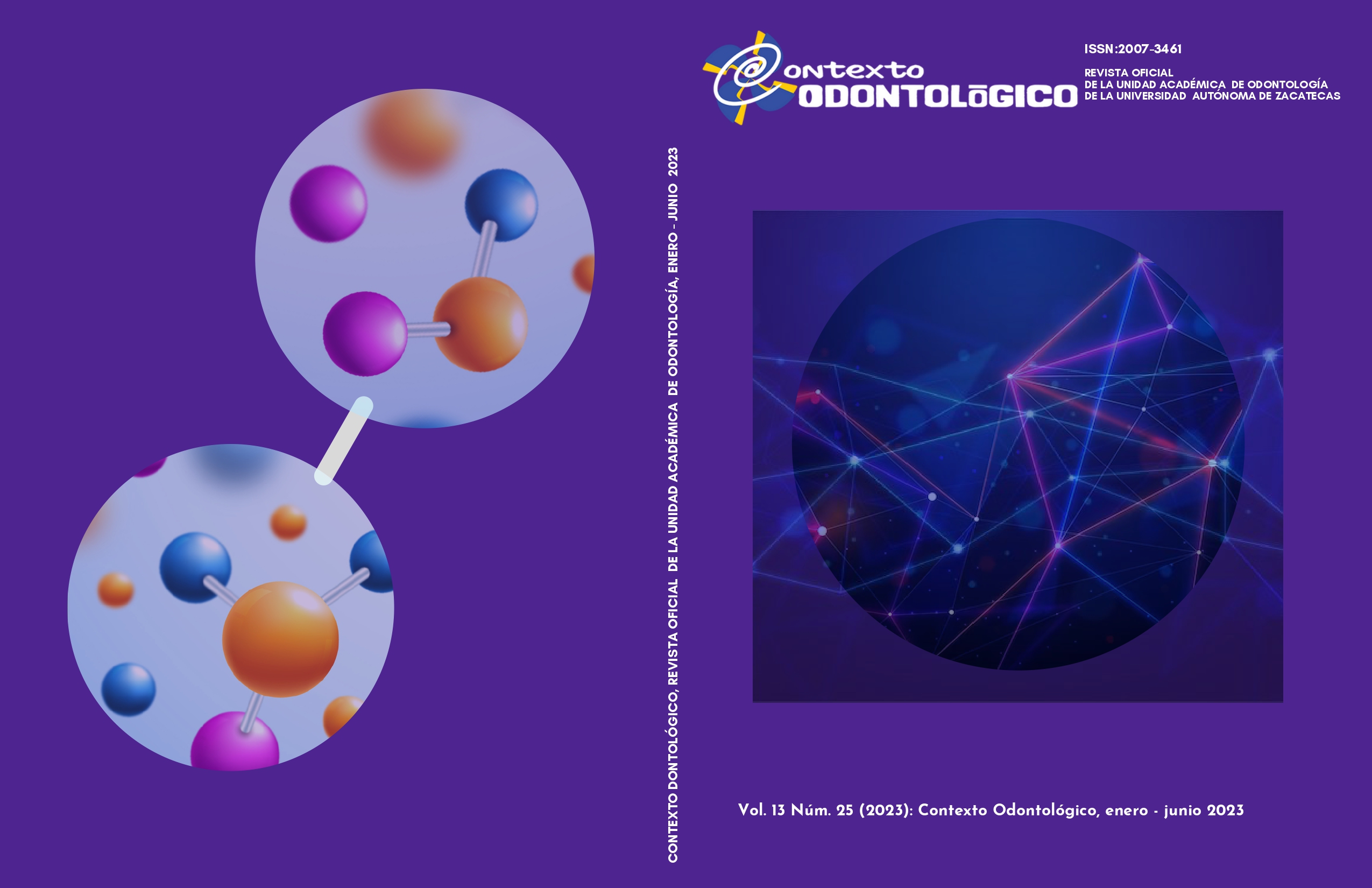Artículos
Publicado 2024-03-17
Palabras clave
- Odontoma complejo,
- asimetría facial,
- agenesia dental,
- fractura mandibular
Resumen
Paciente femenina de 17 años con leve asimetría facial que produce dolor a la palpación. La historia clínica
no mostró hallazgos importantes. La radiografía panorámica reveló una gran lesión radiopaca en la
región molar izquierda de la mandíbula sin 2 piezas dentales. La extirpación quirúrgica del tumor fue el
tratamiento definitivo. Se produjo una fractura mandibular durante la enucleación del tumor; por ello se
utilizó fijación rígida e intermaxilar.
Descargas
Los datos de descarga todavía no están disponibles.
Referencias
- Blinder, D., Peleg, M., & Taicher, S. (1993). Surgical considerations in cases of large mandibular odontomas located in the mandibular angle. International journal of oral and maxillofacial surgery, 22(3), 163–165. https://doi.org/10.1016/s0901-5027(05)80243-7
- Carvalho Visioli, A. R., de Oliveira E Silva, C., Marson, F. C., & Takeshita, W. M. (2015). Giant complex odontoma in maxillary sinus. Annals of maxillofacial surgery, 22(3), 163–165 https://doi.org/10.4103/2231-0746.161131
- Casap, N., Zeltser, R., Abu-Tair, J., & Shteyer, A. (2006). Removal of a large odontoma by sagittal split osteotomy. Journal of oral and maxillofacial surgery : official journal of the American Association of Oral and Maxillofacial Surgeons, 64(12), 1833–1836. https://doi.org/10.1016/j.joms.2005.11.060
- Hoang, V.T., Van. H.A.T., Nguyen, T.T.T., Le, D.T.H., Vo, N.Q., Vo, T.H., et al. (2021). Giant compound odontoma of the mandible in an adolescent. J Pediatr Surg Case Rep,65:101755.
- Katoumasa, K., Lianoua, V., Fyrgiola, M. (2018). Large erupted complex odontoma with dentigerous cyst. J Oral Maxillofacial Surgery, Med, Pathol;30: 330–333.
- Klein, S., Roghani, M., & Rifkin, D. B. (1997). Fibroblast growth factors as angiogenesis factors: new insights into their mechanism of action. EXS, 79, 159–192. https://doi.org/10.1007/978-3-0348-9006-9_7
- Neville, B., Damm, D.D., Allen, C., Chi, A. (2016). Odontogenic cysts and tumors. In: Neville BW, Damm DD, Allen CM, Chi AC, eds. Oral and maxillofacial pathology, 4th ed.St Louis: Elsevier, 674e5.
- Pispa, J., Jung, H. S., Jernvall, J., Kettunen, P., Mustonen, T., Tabata, M. J., Kere, J., & Thesleff, I. (1999). Cusp patterning defect in Tabby mouse teeth and its partial rescue byFGF. Developmental biology, 216(2), 521–534.
- Sharifi-Rayeni, A., Samieirad, S., Mianbandi, V., Saghravanian, N., Tohidi, E. (2019). A rare case of maxillary compound odontoma with an unusual large number of denticles. J Dent Mater Tech, 8:101–106.
- Shi, X., Tan, X., Wang, N., Li, Y., Zhao, Y., Xiao, T. (2022). Surgical resection after orthodontic eruption: A case report of compound odontoma-induced impacted maxillary right central incisor. Heliyon, 8(8): e10197.
- Soliman N., Al-Khanati, N.M., Alkhen, M. (2022). Rare giant complex composite odontomaof mandible in mixed dentition: Case report with 3-year follow-up and literature review. Ann Med Surg (Lond), 74:103355.
- Wen, Y.H., Chen, Y.C., Lee, Y.P., Chiang, C.P. (2022). Ectopic compound odontoma of the nasal cavity. J Dent Sci.17(3):1403–1404.
- Xavier, G. M., Patist, A. L., Healy, C., Pagrut, A., Carreno, G., Sharpe, P. T., Martinez-Barbera, J. P., Thavaraj, S., Cobourne, M. T., &
- Andoniadou, C. L. (2015). Activated WNT signaling in postnatal SOX2-positive dental stem cells can drive odontoma formation. Scientific reports, 5, 14479.
- Ziebart, T., Draenert, F. G., Galetzka, D., Babaryka, G., Schmidseder, R., Wagner, W., & Bartsch, O. (2013). The original family revisited after 37 years: odontoma dysphagia syndrome is most likely caused by a microduplication of chromosome 11q13.3, including the FGF3 and FGF4 genes. Clinical oral investigations, 17(1), 123–130. 40

